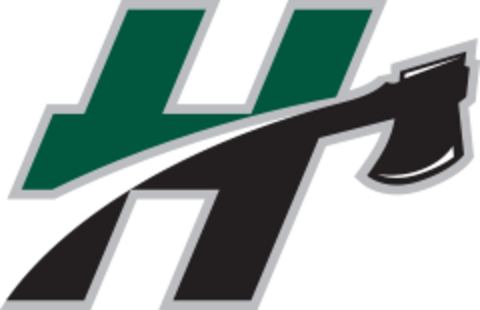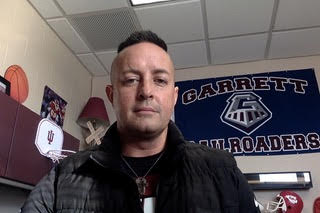
By STEVE KRAH
http://www.IndianaRBI.com
The Huntington (Ind.) University baseball team can’t control the wintry weather and the fact that they have to do almost all of their practicing indoors so far in 2019.
But the Foresters won’t use that as an alibi.
Mike Frame, who is in his 35th season as HU head coach, won’t let that happen.
“We’re not going to use it as an excuse,” says Frame, who has had his players working out inside the Merillat Complex fieldhouse when it’s been too cold or wet to use Forest Glen Park. “It’s the hand that we’ve been dealt so we have to make the most of it.”
Years ago, Frame and close friend Tom Roy (who is now co-head coach at Grace College) came up with ACE. The acronym stands for Attitude, Concentration, Effort. It’s something the student-athletes can control everyday.
“For me, it goes beyond playing baseball,” says Frame, a member of the Huntington University Athletics, Indiana High School Baseball Coaches Association and Northeast Indiana Baseball Association halls of fame. “We talk to these young men from the time we recruit them that attitude, concentration and effort is something take you with you when you leave. Someday you’re going to be an employee and the employer is going to want somebody with a great attitude, great concentration and great effort.
“Someday there’s going to be a young lady that would like to have a husband with those qualities and a little boy or little girl that would like to have a father with those qualities.
“Let’s control the things that we can control.”
The Foresters’ schedule called for first 20 road games to be played on the road.
Of that number, a dozen were contested and Huntington split them, including one win against NAIA No. 19-ranked University of the Cumberlands and two against No. 22 Taylor University. The home opener against Spring Arbor University was moved to the turf at Logansport High School, where a 6-5 win was achieved for 7-6 start to the campaign.
“We have to prepare to go out and play right away against really good competition,” says Frame. “We have to make sure what we do in (the fieldhouse) translates outside whether we’ve been on the field or not.”
Practices are conducted at a high tempo.
“We have to have a gameday mentality in all that we do,” says Frame. “That’s one of the reasons we practice with uniforms on, guys hit with helmets on.”
Because Frame believes baseball was not meant to be played indoors, player earn their positions in the fall. He does not play favorites.
“The best player is going to play.,” says Frame “What year you are in school doesn’t matter.”
What makes Crossroads League baseball so strong?
“There’s some stability at the top in terms of coaching,” says Frame, noting his own longevity and that of Mount Vernon Nazarene’s Keith Veale (30th season) and Taylor’s Kyle Gould (15th season). “Those coaches are working at it.”
Frame says the league is made up of similar schools in terms of resources, scholarship money and the like. Member schools tend to be faith-based with a strong focus on academics.
“We have to ask how they can handle things at a Christian school and academically before we ever look at (athletic) ability,” says Frame.
HU pitching coach Brian Abbott is in his second go-around at Huntington after a stint at league member Indiana Wesleyan.
“It’s a very competitive league,” says Abbott. “These teams compete at a very high level.”
The league has produced professional players and former IWU pitcher Brandon Beachy made it all the way to the big leagues.
Former Huntington player Dalton Combs spent the past two seasons as an outfielder in the San Francisco Giants organization.
“You can get to professional baseball from a small school,” says Abbott, who is also executive director of the IHSBCA. “It might be a little easier as a pitcher. A position player needs to be outside with the at-bats and the ground balls that are harder (to come by) in this weather.”
The winner of the Crossroads League regular season (No. 1 seed in the tournament) and the winner of the Crossroads League Tournament will receive automatic bids to the NAIA Opening Round. If the winner of the regular season (No. 1 seed in the tournament) and the winner of the Crossroads League Tournament are the same team, the second place team from the tournament will be awarded the second automatic bid.
Senior outfielder Donovan Clark (Fort Wayne South Side High School graduate), senior right-handed pitcher D.J. Moore (Homestead), senior first baseman/designated hitter Adam Roser (Northfield), junior right-hander Mason Shinabery (Bellmont), junior left-hander Alex McCutcheon (Huntington North) are part of the current Huntington mix.
All come together for a common cause but with a different perspective.
Clark, who played high school baseball for head coach Sheldon Van Pelt, was on the football team at Indiana University before a back injury ended his career in that sport. With friends Will Coursen-Carr and Tyler Zimske playing baseball at Huntington, he decided to switch his focus to the diamond.
What is the difference between NCAA Division I football and NAIA baseball?
“Baseball — in general — is more mental,” says Clark, who went from defensive back to center fielder. “In football, if you don’t have a tackle, interception or impact the game in some way, you’re not considered the best player on the field.”
The Forester Way has a familiar feel to Clark, who is scheduled to graduate this spring with a business marketing degree.
“It’s a small school,” says Clark. “But the program here goes about things in a big school way. We have a strength coach (Scott Craft).”
With all the indoor workouts, Clark has been getting some reps with the infielders to stay busy and learn something new.
“It’s difficult to come inside and go outside and play a game,” says Clark. “But we’ve done a good job of adapting to it. I’m proud of the team.”
Moore, who played at Homestead for Steve Sotir, has noticed the change between high school and college baseball.
“There’s a big difference,” says Moore. “For one, the game speeds up tremendously. Everybody becomes bigger and stronger. Everybody has better eyes at the plate. When you first come in, you’re facing guys who are three or four years older than you.
“The biggest thing is execution and knowing I can’t just throw the ball over the plate without a purpose like I did in high school. I have to actually hit my spots and have a plan.”
The Crossroads League provides a challenge from top to bottom.
“You never know what’s going to happen in this league,” says Moore. “You’ll have ranked team. You’ll have teams receiving votes. You’ll have teams not even close to receiving votes that will still find a way to win. Any team can come out to play and win. There’s not any dominant team in this whole league.”
Moore has learned how to balance academics and athletics.
“It’s a difficult process, but it’s bearable,” says Moore. “It’s about getting your studies done before practice and keeping in-touch with professors. They understand how busy we are in the spring.”
Moore, a sport management major, says Frame encourages his players to take a heavier course load in the fall, maybe 16 or 17 hours and 12 in the spring with as many morning classes as possible.
Tradition attracted more to Huntington.
“Coach knows what he’s doing,” says Moore. “He’s coached here more than half his life. He’s got a great attitude about things and makes us work hard.”
Roser appreciates the approach and the time spent before practices working ACE attributes.
“We go over Bible verses and examples of how we can be better with our attitude, concentration and effort,” says Roser. “In baseball, the best team doesn’t always win.
“If you have the right attitude and concentration and you put forth the effort, you can beat a good team no matter what kind of talent they have.”
College baseball requires a great time commitment. But Roser, who played for Tony Uggen at Northfield, knew that when he was being recruited.
“It takes awhile for people to adapt to this kind of culture with how much time we put into baseball and studying,” says Roser. “It’s like a 24-hour job almost.
“Coach Frame does a pretty good job of explaining to us what we’re getting ourselves into.”
Roser is slated to graduate this spring with a sports management degree.
Shinabery also played another position while at Bellmont, but is a pitcher-only for the Foresters. While he came out of the bullpen last summer with the Kalamazoo (Mich.) Growlers, he’s been used as a starter for Huntington.
“I have a routine,” says Shinabery. “I know when I’m going to pitch. I just make sure I’m ready to go that day.”
Having support is helpful for the pitching staff.
“Coach Abbott and Coach Frame have faith that all our pitchers can do it,” says Shinabery. “In certain situations, they don’t care who comes in. We can all throw strikes and get the job done
“Just them believing in us helps out me and our staff a lot.”
McCutcheon played his high school baseball in the same town, but began his collegiate career at Vincennes University. After a season, he transferred to Huntington and enjoys the baseball atmosphere.
“Coach Frame sets up the mentality the program has,” says McCutcheon. “We’re a blue collar team. We work hard. Coach Frame encourages toughness in everything. He makes us do things the right way.
“That’s what separates us.”
Assistant coach Thad Frame (Mike’s son) keeps practices humming by constantly reminding players at a swift pace. NAIA game rules call for 20 seconds between pitches and two minutes of warm-up between innings.
“When we pitch, Coach has a timer,” says McCutcheon. “We make sure we are always uptempo.
“Thad wants us to get out on the field as fast as we can. If the hitter is just casually putting his gloves on and we can get him off-guard. That’s an advantage for us if he’s not fully prepared.”
McCutcheon says he knows that two things important to Mike Frame are hustling and being mentally-prepared.
Each day after stretching, players are led through visualization.
“Coach Frame has us lay down for a minute or so and clear out everything,” says McCutcheon. “You see yourself walk everything you’re thinking about out the door and get ready for practice.
“He wants our mindsets to be there everyday. That’s the most important thing for him.”
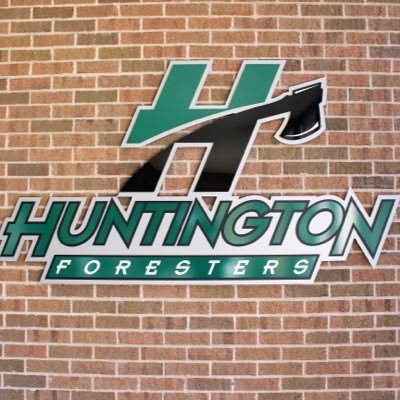
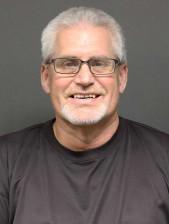
Mike Frame is head baseball coach at Huntington (Ind.) University. (Huntington U. Photo)

Brian Abbott is baseball pitching coach at Huntington (Ind.) University. (Huntington U. Photo)
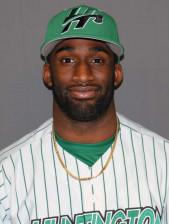
Donovan Clark is a senior baseball player at Huntington (Ind.) University. (Huntington U. Photo)

D.J. Moore is a senior baseball player at Huntington (Ind.) University. (Huntington U. Photo)

Adam Roser is a senior baseball player at Huntington (Ind.) University. (Huntington U. Photo)

Mason Shinabery is a junior baseball player at Huntington (Ind.) University. (Huntington U. Photo)

Alex McCutcheon is a junior baseball player at Huntington (Ind.) University. (Huntington U. Photo)
